#LED ALSACE
Explore tagged Tumblr posts
Text

"The Margraviate will not again be a theatre in which foreign powers play out their tragedies."
- Elector Friedrich Wilhelm of Hohenzollern
On the 25th of December 1674, Swedish troops led by Wolmar von Wrangel, pressured by their French allies, invaded the Margraviate of Brandenburg to force the Elector to pull away his troops fighting alongside the Holy Roman Emperor in Alsace.
On the 21. of July 1675, his army reached Magdeburg; the strenuous, hurried march led to the absence of nearly all infantrymen, who were behind by two days.
The Swedish, who had occupied Havelberg, Rathenow and Brandenburg/Havel by this point, were in the dark about the approaching enemy. Using this advantage, the Elector had his army separate the Swedish army by retaking Rathenow. In the following battles, the invading army was forced into a retreat turned violent rout. Out of 12 000 of Wrangel's men, 4 000 made it back to Demmin.
One of the first significant military successes the Margraviate had after the 30 Years War! It was a relatively small battle on an international scale, especially for the Swedish, who had only intended a distraction tactic, but it lead to some of the most important societal shifts in Brandenburg-Prussia that'd make it into the highly militarised state it'd eventually become.
The Swedish army was a particularly beloathed enemy at this time, partially for their involvement in the 30 Years War and partially for their role in the conflict surrounding Ducal Prussia. This victory was fuel for propaganda, and I wanted to show that with this drawing; Gilbert doesn't believe they'll succeed, because all logic is telling him that marching their horses half into death by exhaustion and leaving behind a large chunk of their forces is spelling doom, not to mention the fact that he has no faith in Johann as a strategist or fighter.
Johann, on the other hand, feels the sting of vengeance so intensely that he can't think of doubt.
115 notes
·
View notes
Text
The parliamentarians, led by former prime minister Gabriel Attal, said a law to that effect would be an act of reparation for Dreyfus, whose condemnation came against a backdrop of the late 19th century's rampant anti-Semitism in the French army and wider society.
It would, said Attal, also send the signal that the fight against anti-Semitism continues today, more than a century after the Dreyfus affair divided French society and gave rise to writer Émile Zola's famous "J'accuse" pamphlet in favour of the disgraced captain.
"The anti-Semitism that targeted Alfred Dreyfus is not in the distant past," Attal said in a draft law to be submitted to parliament.
"Today's acts of hatred remind us that the fight is still ongoing."
Dreyfus, a 36-year-old army captain from the Alsace region of eastern France, was accused in October 1894 of passing secret information on new artillery equipment to the German military attache.
The accusation was based on a comparison of handwriting on a document found in the German's waste paper basket in Paris.
Dreyfus was put on trial, amid a virulent anti-Semitic press campaign.
Despite a lack of evidence, he was convicted of treason, sentenced to life imprisonment in the infamous Devil's Island penal colony in French Guiana and publicly stripped of his rank.
But Lieutenant Colonel Georges Picquart, head of the intelligence services, reinvestigated the case in secret and discovered the handwriting on the incriminating message was that of another officer, Ferdinand Walsin Esterhazy.
When Picquart presented the evidence to the general staff of the French army, he himself was driven out of the military and jailed for a year, while Esterhazy was acquitted.
In June 1899, Dreyfus was brought back to France for a second trial. He was initially found guilty and sentenced to 10 years in prison, before being officially pardoned – though not cleared of the charges.
Only in 1906, after many twists, did the high court of appeal overturn the original verdict, exonerating Dreyfus.
He was reinstated with the rank of major. He served during World War I and died in 1935, aged 76.
Attal said that without the years in exile and his public humiliation, Dreyfus "would have risen to the highest ranks naturally".
No date has been set yet for a vote on the proposal.
France is home to the largest Jewish population outside Israel and the United States, as well as the largest Muslim community in the European Union.
There has been a rise in reported attacks against members of France's Jewish community since Palestinian militant group Hamas attacked Israel on October 7, 2023 and the Israeli military responded with a devastating military offensive on the Gaza Strip.
38 notes
·
View notes
Text
Why I see the Dark Kingdom, Quirin, and Varian as Jewish:
So I promised a post or so again to expand on my Jewish Varian headcanons, and I wanted to explain my rationale for my headcanon.
Names:
Adira’s name is Hebrew: אַדִּירָה. It means “strong” or “mighty.” Notably no one else in the series has a Hebrew name except Ruth, which is a common name used more widely. Adira however is a much rarer name and i have not seen it used beyond Star Trek and Hebrew. Given this is a world in the renaissance to the late 1700s (personally, I interpret it in the late 1700s), it also means that the modern state of Israel does not exist yet. Which leads me to my next point.
The Dark Kingdom: Exile and Return
Within Tanakh, there is this major theme of exile (galut) and return as well as the “promised land.” The Latter Prophets (Isaiah, Jeremiah, and Ezekiel) expanded on this significantly. The Jewish people experienced two major exiles from the destruction of both of their Temples, something commemorated on Tisha B’av. These exiles were also preceded by environmental disasters because Hashem withdrew His protection. The land itself is described as a “land of milk and honey” and incredibly fruitful. However, in times of trouble, the land fails to yield to the Israelites and sees drought, famine, and fire.
The Dark Kingdom sees something similar. The land itself has become infested with near indestructible black rocks. Any attempt to destroy these black rocks has led to severe illness and death. Ultimately, all the kingdom’s inhabitants are forced away from their home to survive even as the black rocks spread from other people’s unwise actions (*cough* Fred *cough*). This leads to my next point.
The Parallel to Court Jews: Quirin
So Quirin’s role is very interesting. Reading between the lines, it seems that King Frederic swore Quirin to secrecy. Quirin has to communicate to the king in code when talking in front of other people about the black rocks. Even when it appears that he lied in front of his son. Quirin warns Varian to stop talking about what occurred (“That’s enough, Varian.”) which contrasts with his usual patient but exasperated behavior. This matter suggests a life or death matter and something that he could not even talk to his own family about.
There are parallels in Jewish history with this too: court Jews were a fixture in the Central Europe from the 16th century onwards (about the time period when Tangled the Series/Rapunzel’s Tangled Adventure takes place). They were in a precarious position often wearing multiple hats as banker and protector of the Jewish community. Court Jews got certain privileges in exchange for their services and wealth. Court Jews had personal relationships to the people in power usually a prince. this relationship proved very risky to many court Jews (see Joseph Suess Oppenheimer). One wrong move and the entire Jewish community could be forced to leave or less charitably, killed.
Now whether Rapunzel takes place in Central Europe is debatable. The location of the finale shot is somewhere in modern day France. However, certain parts of modern France (Alsace) were part of the Holy Roman Empire depending on the time period. A lot of names used are German/Central European or used frequently in the region: Rapunzel, Frederic, Quirin (which is only used as a Roman name otherwise according to behind the name), Mother Gothel, Edmund etc.
We see some evidence of wealth or at least past wealth in Varian’s household. First, the family lives in a castle rather than a shack or a cottage. Second, the amount of red clothing in Quirin’s household. Quirin wears a dark red shirt, Varian owns a red scarf, and his mother is seen wearing a lot of red. Red was one of the more expensive dyes with madder being the cheapest version. There is also use of furs in Varian’s coat and Quirin’s vest, which was not cheap either. However, Quirin and Varian also straddle the line with being commoners. We see Quirin farming pumpkins and they are clearly inferior to the king. In addition, Old Corona appears to be impoverished, which only worsened from the black rocks.
Jewish Values: Education and Promises
Education is a major Jewish value. We believe in questioning and wrestling with Hashem. Literacy was of major importance to us and Jewish communities often had high literacy rates often higher than the rest of the population. Part of the reason is because we’re people of the book. The other reason is because literacy and knowledge are mobile skills that can be taken with us when we got kicked out again. Varian owns many books, and we see him read and write on the regular. Books weren’t. Education expanded in Western and central Europe during the enlightenment but schooling as a system was still in its early stages. Books were expensive, yet it is likely that those who place a higher value on education would invest in such.
The idea of a promised land forms a major ideological core for Judaism because it provided hope. Hope allowed the long-suffering Jewish people as a whole to keep going even during Egyptian enslavement, massacres, and pogroms. There’s a reason Israel’s national anthem is named Hatikvah (“the hope”). Some of our biggest quarrels come from when covenants and promises are broken. Vows in the biblical era were taken extremely seriously.
Within the show, Varian emphasizes the promises that Rapunzel made but ultimately broke. It may not just “bad behavior” or massive hurt but a major breach in values. Rapunzel broke the agreement between subject and ruler: a ruler was to protect their subjects.
Appearances
Varian, Quirin, Hector, and Edmund all have dark hair. Both Quirin and Edmund have aquiline noses, which are common Mediterranean features. Corona is nowhere near the Mediterranean 🤨.
Varian’s mother also has red hair. Red hair is a polygenic trait that often occurs in a recessive fashion. That means two parents with other hair colors can carry red hair traits and pass them to their children. In the Middle Ages and the Renaissance, Jews were often believed to red hair. Judas and Shylock from the Merchant of Venice were often depicted with red hair. This stereotype has some grains of truth as certain Tanakh figures like Esau and David have red hair or are described as ruddy and red. Because most Jews especially in the premodern age married within the tribe, a lot of traits that are rarer among the general population have been seen more frequently in Jewish populations including red hair and genetic conditions.
The Ham Sandwich Paradox: Obscure Jewish Food History
But wait! What about Varian’s ham sandwiches? Ham is made of pig and pigs aren’t kosher. Therefore, they can’t be Jewish.
Ah, this is where I talk about Jewish ham. Ham made of pork is indeed not kosher at all. However, Sephardic Jews and the Jews of Italy have made “Jewish ham” and “Jewish prosciutto” since about the Renaissance era. It came from curing goose or duck, which were kosher birds. I have tasted cured duck at a restaurant, and it takes remarkably like pork. One could interpret Varian talking about pork ham but Varian doesn’t say what kind of ham and he could just as easily be referring to “Jewish ham.”
Why Jewish representation matters
Tangled the Series/Rapunzel’s Tangled Adventure is a piece of media that I wrestle with a lot. The series did a lot of great things but it and the original movie did a piss poor job at handling Jews (in the movie and series) and Romani (definitively in the series). Here I will discuss the Jewish aspect since I am Jewish, not Romani.
Mother Gothel’s character resembles the very definition of old blood libels common in Europe that “Jews kidnap gentile children (especially blondes) and use them for ritualistic purposes.” Her design was changed from gothic romantic to something more “Jewish-coded” and thus more villainous. This is very much a problem especially as we consider the rise of antisemitism. It became worse in the series when we found out that Cass was Gothel’s daughter and that Cass was abandoned in favor of kidnapping Rapunzel. Cass then became a villain because of this. Media depictions like Gothel actively harm our community by reinforcing old dangerous stereotypes. Given these strong negative representations of Jews, I wanted to dilute the pool through making positive Jewish representation. I wanted to make space for myself and other Jews within this piece of media that has harmed our community.
These hints may simply be coincidental if taken in isolation. In stringing them together, we can construct a space where Jews can be represented positively and accurately in the tangled universe.
#Jewish Varian#Jewish dark kingdom#Jewish Quirin#Jewish Adira#Jewish Hector#Jewish Edmund#Jewish representation#tts headcanon#rta Headcanon#antisemitism#tangled the series#rapunzel’s tangled adventure#tts#rta#tts critical#rta critical#jumblr#Jewish coding#Jewish history
42 notes
·
View notes
Photo

The Sixteenth-Century Massacre of the Waldensians of Mérindol
As the Reformation developed in France in the first half of the 16th century, there were several episodes of severe repression which preceded the Wars of Religion (1562-1598). These were times of great hardship and oppression against those who embraced Protestant teachings. One notable chapter of persecution took place in the Luberon region of France against the Waldensians (Vaudois), the spiritual descendants of Pierre Waldo, which led to the Mérindol massacre in 1545.
Early Persecution
Early in the 12th century, Pierre Waldo (l. 1140–1218) took a vow of poverty, confirmed by Pope Alexander III (served 1159–1181), and became the leader of a sect known as the Waldensians. Waldo was among the forerunners of the Reformation who sought to purify and reform the Catholic Church from within through a return to apostolic teaching. Initially, he did not seek separation from the Catholic Church or the establishment of a new sect. In time, partly due to their emphasis on preaching the gospel in the local language, Waldo and his followers were banned from preaching by Pope Lucius III (served 1181–1185). Waldo was excommunicated at the Council of Verona in 1184, and Waldensian teaching was condemned at the Fourth Lateran Council in 1215.
Exiled from their city of Lyon, the Waldensians spread to the valleys of Dauphiné and the Alps of Piedmont, to Languedoc, and to Spain. The Inquisition failed to stamp them out and many of the exiles settled in the Luberon region in southern France. The Waldensians sought to live in peace in the sheltered valleys of the Luberon where they drained the swamps and cultivated lands belonging to Italian lords. It is said that people inhabiting the plains feared the Waldensians who had a reputation as sorcerers. At that time, they had spiritual leaders called uncles (barbes) in their language who had authority over the people. The barbes were considered wise and venerable, and mysterious powers were attributed to them. Their brothers in Dauphiné had previously suffered persecution and many had fled to Luberon for safety.
The archbishop of Aix feared that this concentration of heretics might embrace the Reformation. Around 1530, the inquisitor Jean de Roma was sent to investigate the Waldensians where he committed atrocities and enriched himself at their expense. As a result of this initial violence, two Waldensians, Maurel and Masson, crossed the frontiers to Alsace and Switzerland to confer with Reformed leaders in Geneva. They were persuaded of the need to reform their beliefs, to definitively break with superstitious practices, and were sent back with letters for their brothers in Mérindol. Only Maurel arrived home safely; Masson was arrested and burned alive at Dijon. A decisive meeting took place in Piedmont in 1532 with Waldensian leadership from different regions. William Farel (l. 1489–1565), over six days, convinced them to preserve only two sacraments, baptism and the Eucharist, without the mystical sense given by the Catholic Church. Farel welcomed them to the Reformed faith with enthusiasm and called them “the elder sons of the Reformation.”
Continue reading...
55 notes
·
View notes
Text
Heritage News of the Week
October 19 was International Archaeology Day! I hope you celebrated by hugging an archaeologist and/or punching a Nazi.

Discoveries!
Archaeologists were preparing to investigate a Stone Age settlement outside Varberg. But they came across a gigantic burial ground from the Viking Age.
Traces of meeting hall and houses found at bronze age site in Germany
Archaeologists digging at the site of a bronze age kingdom in northern Germany have uncovered remains of what they say was a surprisingly densely populated community of farmers and traders whose lives were upended by climate change.
2,000-year-old tomb holding 12 skeletons found at Petra where 'Indiana Jones and the Last Crusade' was filmed
Archaeologists have discovered a 2,000-year-old tomb containing the remains of 12 individuals at Petra in Jordan.

BUT: ‘A little hyped up’: experts downplay claims over Petra archaeological find
Researchers urge caution after Jordan tomb excavation and say new clues about Nabataean culture may lie elsewhere

Rare hoard of Roman-era coins discovered in German mountains — miles from the empire's frontlines
A metal detectorist in Germany has discovered a rare hoard of almost 3,000 Roman-era coins outside of the Roman Empire's ancient borders and far from any known Germanic tribe settlements of the time.
A royal tomb dating back approximately 5,000 years discovered
In the Wangzhuang ruins in the city of Yongcheng in central China’s Henan province, a tomb, thought to be the tomb of a prehistoric king, was discovered, thought to date back about 5,000 years.
Archaeologists make ‘sensational’ discovery of Armenia’s oldest church
Archaeologists have uncovered the ruins of an Armenian church dating back 1,700 years making it one of the oldest such surviving monuments in the world.
Study suggests children made pottery in the Ebla kingdom
According to a statement released by Tel Aviv University, about two-thirds of the 4,500-year-old pottery vessels unearthed at Syria’s site of Tel Hama in the 1930s were made by children as young as seven or eight years old.
Historic wreck of the Hetman Żółkiewski discovered
Archaeologists have discovered the submerged wreck of the Hetman Żółkiewski in the town of Nowy Dwór Mazowiecki, Poland.
Fragments of mosaic floors unearthed in ancient Sicilian house
The ruins in Vizzini, Sicily were built sometime between the 2nd and 4th century C.E.
Ancient humans waited out last ice age in frigid Central Europe, surprising study finds
Most animals retreated to small, warmer enclaves. But some, like humans, seemed to have stayed where they were.
Sixty elongated structures of unknown function and Neolithic silos discovered in France
The Pfulgriesheim site, located in northeastern France’s Alsace region, underwent extensive archaeological research, [which] led to the discovery of over a thousand archaeological structures, including an important settlement center from the Late Neolithic period and isolated medieval funerary monuments.
A trove of 500 ancient Babylonian treasures was just unearthed in Iraq
While excavating the 19/3 site in Iraq’s Al-Fayadiya district, a team led by archaeologist Quhtan Abbas Hassan Aboud has discovered two dwellings filled with almost 500 artifacts, giving new insight into the lives of its prehistoric residents.
Roman marble statue unearthed in Bulgaria
A larger-than-life Roman statue dated to the second or third century A.D. was uncovered during construction work near the coast of the Black Sea, outside the walls of the ancient city of Odessos.
Archaeologists uncovered around 2,000 years old a remarkable inscription dedicated to an athlete in ancient city of Anemurium
During the excavations in the ancient city of Anemurium in Mersin in southern Türkiye, an inscription consisting of 13 lines honoring a wrestling athlete of the period, which is thought to date back to 2 thousand years ago, was found.
Rare gold Rhenish guilder discovered near Kamień Pomorski
According to experts, the coin is a gold Rhenish guilder, the standard gold currency coin of the Rhineland during the 14th and 15th centuries.
WWII British sub that sank with 64 on board finally found off Greek Island
The discovery of the WWII wreck solves an 81-year-old mystery about the submarine's fate.
Archaeologists unearthed more than 4,000 clay seals, around 5,000 years old, in western Iran
Recent excavations at Tappeh Teleneh, in Kermanshah’s Kozran district, revealed approximately four thousand clay seals dating back five thousand years.
Museums
After his triumphant Tate installation, The Procession, the artist is preparing a radical exhibition tackling Britain’s imperial past. He talks about why we must return plundered artefacts and rethink attitudes to heritage
Extinct no more: AI is bringing the dodo back to life (kinda) at a museum in Cambridge
A museum experiment in Cambridge is allowing visitors to have a conversation with a dodo, and other dead animals, with the help of artificial intelligence.


London’s National Gallery restricts liquids and big bags amid climate protests
From October 18 onwards, the National Gallery in London is prohibiting liquids and big bags on its premises in a bid to step up security measures amid ongoing protests targeting its masterpieces
‘This could wreck the area’: anger at new Guggenheim in Spanish nature reserve
Environmental groups are among those appalled at plans to expand into Guernica and the Urdaibai reserve – but others welcome it
The hotly anticipated Grand Egyptian Museum kinda opens for a trial run
As part of a trial run helping management prepare for the official, hotly anticipated, but as-of-yet undisclosed opening date later this year, the institution will open its doors to 4,000 lucky visitors.
The world’s first barbecue museum is coming to Kansas City
A new museum will celebrate America’s long love affair with fire- and smoke-kissed meat. Next spring, the Museum of BBQ is slated to open in Kansas City, Missouri, a place that’s famous for its thick, sweet-and-spicy sauce and burnt ends.
Little ones will also be able to play in a ball pit-style area designed to look like a giant crock of barbecued beans

Texas Art Museum Briefly Shutters Show About Cowboys, Race, and Gender After Visitor ‘Feedback’
The Amon Carter Museum of American Art in Fort Worth, Texas, closed and then reopened an exhibition that unpacked the concept of the cowboy, critiquing it through the lens of race, gender, sexuality, and nationality.
Munsee-Delaware First Nation to visit Wampum belt tied to their history
Later this month about 50 members of the Munsee-Delaware First Nation — located outside of London, Ont. — will take a trip to the United States to pay a visit to what might be best described as an old friend. But instead of visiting a person, they'll be stopping in to a Munsee language and history symposium in Princeton, N.J., to check in on a Wampum belt that originated in their community and is believed to be more than 250 years old.
Repatriation
The Metropolitan Museum of Art has returned another ancient Greek drinking vessel to Italian officials overseeing the countries’ repatriation efforts after finding the artifact was likely looted from its origin site.
Heritage at risk
The declaration by Europe’s oldest intergovernmental organisation founded to uphold rule of law across the continent includes a demand on the Russian Federation to pay reparations to Ukraine. In a statement released on Wednesday, the Council of Europe “deplored” Russian attacks on cultural heritage sites in Ukraine since the start of Moscow's full-scale invasion in February 2022.
Fossil Fuel Development Projects on UNESCO Protected Sites to Increase by 70 Percent, Report Finds
The rate of fossil fuel extraction from UNESCO-protected heritage sites is expected to increase by over 70 percent over the course of several decades, despite global agreements to stop the practice, according to a new report from the German research group Leave it in the Ground Initiative (LINGO).
The history of Caribbean slavery is being lost. Britain must act now to preserve it
Climate-related disasters are destroying precious records. At next week’s Commonwealth summit, King Charles can show his support for their protection
Odds and ends
Black archaeologists join team investigating off the coast of Mozambique as part of global project to identify and tell stories of wrecked ships involved in transatlantic slave trade
How to experience Winnipeg's Indigenous culture
Local Anishinaabe writer Professor Niigaan Sinclair guides you through Winnipeg's Indigenous history and community from healing ceremonies at The Forks to Bannock pizza at Feast Café.
British escaper’s stolen Napoleonic uniform and journal go on display in London
PoW Charles Hare, 19, escaped in rare uniform with tall feathered hat and travelled back to Lincolnshire – accompanied by his dog
13 notes
·
View notes
Text
Lover | Kim Mingyu
How you two get close
Lover Series🖤🌼

Pairing: Mingyu x reader (Joshua as non biological brother)
Genre: romance, angst, series
Note: sorry for late late update! Life has been busy lately 🤏
_____________________________________
Mingyu: Hyung, is it okay if I call your sister? I think I'm lost.
Anxiety crept over Mingyu as he awaited Joshua's reply to his text. His brows furrowed as he contemplated the situation. He wasn't naive; he had a keen sense of direction, and his ability to read maps had guided him through many places. However, this time, he found himself on an endless road, far from his intended destination – the hotel. He had been walking for nearly an hour, his patience wearing thin as he continued his fruitless search for the elusive lodging. Mingyu began to suspect a glitch in his map or GPS system, which had led him astray and now left him stranded in unfamiliar territory.
Shua: Totally fine.
Shua: But how on earth did you manage to get lost? Lol.
Mingyu: ikr :(
Mingyu: I'll call you later.
Mingyu's fingers tapped impatiently on his phone screen as he dialed Joshua's sister. The first two attempts went unanswered, leaving him to wrestle with mounting frustration. "Kim Mingyu, calm down," he muttered under his breath, willing himself to remain composed. On the third attempt, he was met with the sound of ringing before a voice answered on the other end. A polite greeting in Korean flowed from the speaker. Mingyu, momentarily taken aback, realized he was still using his Korean phone number, which explained the language preference.
"Hello," he replied, his voice laced with a touch of nerves. "I'm Mingyu, a member of Joshua's group."
There was a brief pause, followed by the woman's response, "Ah, is there something I can assist you with?" Collecting his thoughts, Mingyu explained his predicament to her, relieved as she comprehended his situation.
"It's not uncommon. Could you please share your location? I'd be happy to pick you up by car."
Gratefulness surged within Mingyu, and he quickly messaged his location via KakaoTalk. Exhaustion had overridden any resistance to her kindness; he waited in front of a shuttered shop, the clock edging towards 11 pm. Paris at night had a wild energy, evident in the unsteady steps of inebriated passersby. Though anxiety gnawed at him, Mingyu focused on projecting an image of calm indifference to the boisterous crowd. Yet, truth be told, he nearly jumped out of his skin when a drunk passerby carelessly kicked a steel garbage can.
After fifteen tense minutes, the approach of a car interrupted his thoughts. A call from Joshua's sister confirmed that this was her vehicle. "Hello, I'm near the shop you mentioned," Mingyu greeted, waving in the direction of the approaching car.
"Ah, there you are," she responded as the vehicle came to a halt. Mingyu's smile betrayed the relief coursing through him, the promise of a comfortable bed and a rejuvenating shower spurring him on.
The car's window rolled down, revealing a familiar face. "Oh, we met yesterday."
*
Once he was cleaned up, Mingyu took it upon himself to find your Instagram account. The brief drive back hadn't dulled his sense of gratitude, prompting him to offer you a late-night drink in appreciation. With a looming trip to Alsace on the horizon, the chance of another encounter with you was slim, hence his motivation was to make the most of the present moment. The hotel bar became a haven for conversation for both of you, Joshua and vacation plans becoming the backdrop to a more personal exchange. Mingyu soon noticed the dynamic of the conversation; you were an attentive listener, sharing very little about yourself.
This intrigued him, and he couldn't help but wonder about the enigma before him. He realized he knew little – your name, the duration of your residence in Paris, and your non-biological relationship with Joshua. That's it.
Settling onto the bed, Mingyu embarked on a digital search, scrolling through profiles of people with your name. A chuckle escaped him as he stumbled upon an account named after a fruit that also linked to your primary account, illuminating a glimpse into your life.
"Wow," he muttered, momentarily absorbed in his findings. Your identity as an editor at a prominent fashion magazine unfolded before him. Two contrasting personas emerged – one account spotlighted your professional accomplishments, the other a canvas for your private world, adorned with friends, aesthetics, and even a snapshot of you with Joshua's mother. Mingyu couldn't help but acknowledge that the evidence supported your relation to Joshua.
A sudden realization jolted him, prompting him to call his Shua Hyung.
"Hyung," he whined, seeking solace in Joshua's familiar voice.
"What's up? Have you made it to the hotel?" Mingyu hummed in affirmation, narrating the events of the day, including his unfortunate tardiness for the lunch reservation you had recommended.
"So, you met y/n in Paris before you even reached out to her? That's incredible," Joshua marveled. Mingyu's curiosity then led him to inquire about whether any other members had encountered you.
Joshua recollected how you had crossed paths with Seungcheol and Jeonghan during a visit to his apartment, revealing the varying levels of familiarity among them. "They were at my place when she showed up. Jeonghan probably knew about her from my conversations, but Seungcheol was taken aback – I still remember the surprise on his face that night."
Mingyu chimed in, sharing his experience of an hour-long chat with you at the hotel bar. "She was an amazing companion, a great listener," he noted, receiving a nod of agreement from Joshua. As the conversation flowed, Mingyu's musings shifted to the possibility of fostering a friendship with you.
"If I ask her to be a friend, she won't turn me down, right?"
*
Me: Have you arrived in Alsace?
Mingyu: Just touched down a few minutes ago. The vibe here is entirely different.
Mingyu: The scenery, the people, even the scent in the air.
Me: Isn't it fascinating? You must visit the spot I recommended, it's close to the station.
Me: The famed apple tart is eagerly awaiting your arrival...
Mingyu: I'm hoping they'll let me in with these suitcases.
Mingyu: /sent a photo showcasing his two pieces of luggage
Mingyu: I sent one ahead yesterday, by the way.
Me: Seems like you're all set for some Alsace-inspired OOTDs.
Me: And don't forget to pick up some basic language skills!
Mingyu: Language learning is no joke! I should've brought you along to help.
Mingyu: By the way, your photography skills were on point that day.
Me: Apologies, but my schedule's packed. Gotta run!
Mingyu: Take care and catch you later!
#mingyu imagines#seventeen angst#seventeen imagines#mingyu scenarios#mingyu imagine#mingyu smut#mingyu x reader#kim mingyu#mingyu au#mingyu fluff#mingyu recs#mingyu#kim mingyu imagines#seventeen fanfiction#seventeen fanfic
114 notes
·
View notes
Note
Would you put Louis XIV as overrated?
Oof, that's a tough one.
It's particularly hard to answer because the reign of the Sun King also saw the tenure of some of the most influential chief ministers in French history: Mazarin, and Colbert.
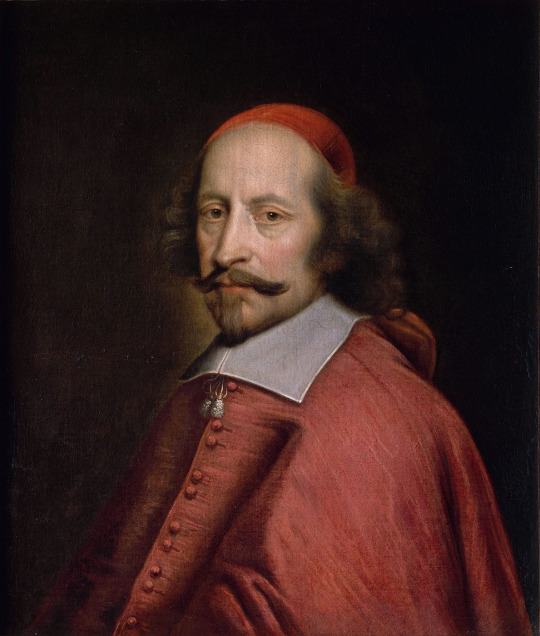
While perhaps not quite as famous as a certain cardinal whose schemes kept getting foiled by the Three Musketeers, these guys were world-historically important.
Mazarin was Richelieu's political heir, and brought his predecessor's policy of using the Thirty Years War as a way to break the back of Hapsburg dominance to a successful conclusion. The Peace of Westphalia not only served as the foundation for modern international relations, but also expanded France's position in Alsace and the Rhineland - especially when Mazarin pulled off an anti-Hapsburg alliance with the new League of the Rhine.
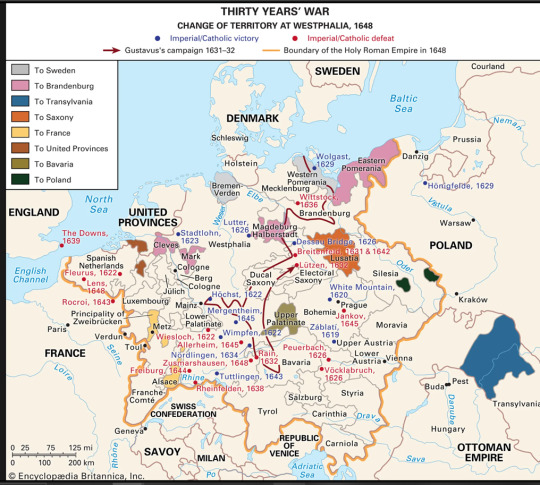
At the same time that France was winning the Franco-Spanish War, which won them a big chunk of territory in the Low Countries around Artois, Luxembourg, and parts of Flanders, and all of the territory north of the Pyrenees Mountains including French Catalonia. It also got Louis XIV the hand of Maria Teresa, which would eventually create the catalyst for the War of Spanish Succession and the War of Austrian Succession...
And while Mazarin was doing all of this, he was also busy crushing the Fronde uprising led by le Grand Condé, which he eventually accomplished in 1653, and creating a formidble system of centralized royal government through the intendants that ended the power of the feudal nobility.
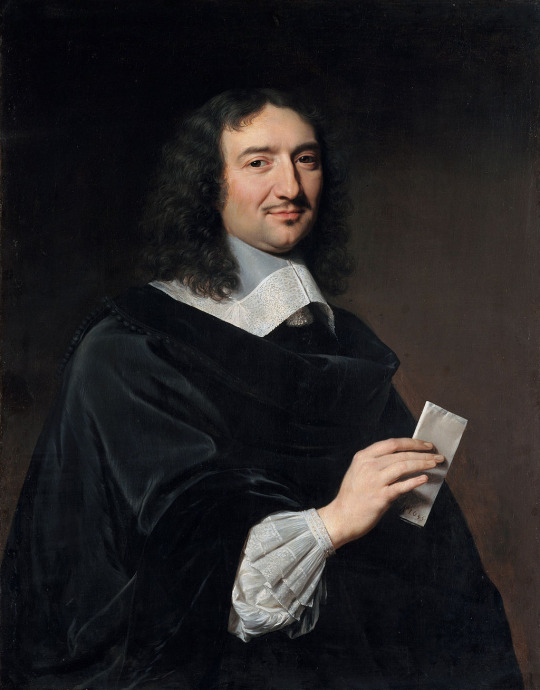
As for Colbert, he was the guy who figured out how to pay for all of this. The single biggest reason why economists need to shut the fuck up when they talk about mercantilism, Colbert was the financial and economic genius of his age. Remember all those canals I'm so crazy about? Colbert built them. Specifically, he was responsible for the Canal des Deux Mers, transforming France's economy by linking the Mediterranean to the Atlantic.
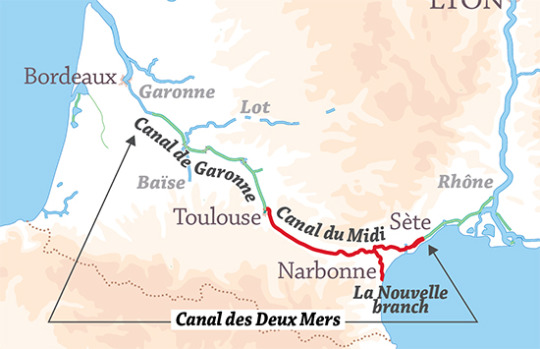
He also turbo-charged France's economic development by restructing public debt to reduce interest payments and cracking down on tax farmers, reforming (although not ultimately solving) the taxation system of the Ancien Régime by using indirect taxes to get around tax evasion by the First and Second Estate, equalizing (but not ending) internal customs duties, and putting the power of the state into supporting French commerce and manufacturing. This included significant tariffs to support domestic producers, direct public investments into lace and silk manufacturing, and the creation of joint-stock corporations like the French East India Company. (This also meant Colbert's direct promotion of the slave trade and the Code Noir in order to generate hugely profitable investments in Haitian sugar and tobacco plantations for import into France and the rest of Europe.)
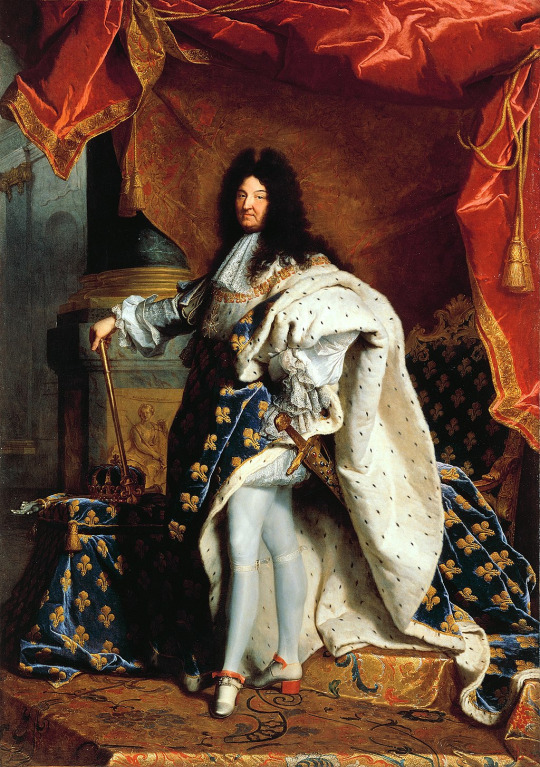
This makes it a little difficult to separate out what credit belongs to these guys versus the guy who hired them. What I can say is that Louis was directly responsible for Versailles, but also for the revocation of the Edict of Nantes.
#history#historical analysis#cardinal richelieu#cardinal mazarin#jean baptise colbert#louis xiv#versailles#french history#early modern history#economic development#mercantilism#political economy#early modern state-building#early modern period#early modern europe
46 notes
·
View notes
Text
MEDITATIVE WEEK OF POETRY BARBARA HAMBY

My sister and I are talking about our childhoods,
which have the same cast of characters, but differ
so much that it's hard to believe we shared a bedroom
for so long, and she often recounts how I threw up
on her, which I don't remember and neither did our mother,
but my sister believes it so it's part of her story
but not mine, and I'm the only one who remembers our parents
being in love or living in France in a little village in Alsace
called Paradis, and on our honeymoon, my husband and I
drove through but I couldn't find the house, and twenty
years later, my mother and I made the same trip, and she
couldn't remember where the house was, either,
and she recalled a man who'd walk by every aftenoon
and urinate right across the street from our house,
which was kind of weird, but there was a lot of anti-American
feeling, and when my mother remembered the guy peeing
that led us to the house, toot sweet, as she could say
in years to come, along with mangez, the only French
she picked up, and our landlords didn't want children
in their fancy parlor but made one exception at Christmas
and my mother created one of her magical holidays, with a tree
that dazzles, and my sister does remember how December
was a goregous time thought she doesn't remember that one
or the snow piled high or how cold it was that year
and when I think of that time the Welsh word hiraeth
comes to mind, or the longing for a place that never was,
and maybe that's what Paradis was with fresh baguettes,
delivered every morning with milk and cheese,
and my mother so young and pretty and there was a fireplace
in the room next to the kitchen where she fried chicken
and made pot roasts and she would call us in from play
with, Mangez, kids, which my sister remembers
from three years later in Virginia, De Gaulle having kicked us out
because according to my mother America
wouldn't shre the nuclear secrets with the French,
and that's a big secret to share I'll grant you,
and France had just come through two wars which messed up
the landscape, but time has healed these wounds,
and you see a lot of nuclear plants too, so someone
let those secrets slip, so I wonder
if Paradis even existed, because my mother and father
are both dead and I'm the only one left
who remembers my mother slathered those baguettes
with peanut butter that no French child would ever eat,
and the little picnic place with merry-go-rounds in the water
of the lake, and when my husband asked a man
who lived in Paradis about our landlord either Monsieur Iray
or Siray, because my parent had forgotten, he said,
No Americans lived here, so I'm thinking it was all
a dream of paradise that my little girl's heart
made up out of nothing, even my young parents in love
with each other and the fire in the dark cave of their hearts.
#meditative week of poetry#mwp#poetry#sixth finch#barbara hamby#Ode on Paradix and longing for a place that never was
2 notes
·
View notes
Text

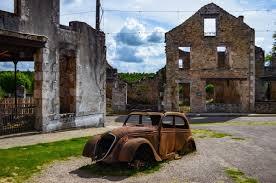

On June 10, 1944, during World War II, the village of Oradour-sur-Glane, France, became the site of a horrific massacre. Oradour-sur-Glane was a small, rural village in the Haute-Vienne department in central France. At the time of the massacre, it had a population of around 600 residents, mostly farmers and artisans. The SS soldiers rounded up the entire population and separated them by gender in the market square. The German military executed hostages and imprisoned those suspected of supporting or sympathizing with the resistance movement in concentration camps. Overall, the scale of violence and civilian casualties was extreme. Only seven villagers survived the massacre—six men and one woman—each of whom was injured. Around fifteen additional residents either managed to flee before the massacre began or were hiding. After this tragedy, the village was destroyed and left in ruins. The massacre at Oradour-sur-Glane became a symbol of Nazi brutality. After the troops departed from Oradour-sur-Glane, Diekmann assembled his officers and non-commissioned officers and instructed them to remain silent about the killings. To address growing public anger and prevent the Vichy government from aligning with the Allies, the German Army Commander-in-Chief in the West ordered an investigation into the massacre. In January 1945, Okrent suspended the investigation, determining that “military concerns justified the retaliation.” In 1953, a French military court in Bordeaux put 21 former members of the 2nd SS Division on trial for their roles in the atrocities at Oradour-sur-Glane and Tulle. Fourteen of the accused were ethnic Germans from Alsace. The court found 20 of them guilty, sentencing two to death and the others to prison terms ranging from five to 20 years. However, amnesties and pardons led to the release of all the convicted, including those sentenced to death, within five years of the trial. In 1981, the German Democratic Republic arrested Heinz Barth, a former SS Sergeant and platoon commander whose unit had participated in the shooting of Oradour-sur-Glane’s men. Barth was sentenced to life in prison by an East Berlin court. He was released in 1997 and passed away in 2007 at the age of 86. Oradour-sur-Glane will always be significant and ensure remembrance of the victims of that night.
“Oradour-Sur-Glane: An Echo from History.” The History Press, March 29, 2024. https://thehistorypress.co.uk/article/oradour-sur-glane-an-echo-from-history/.
United States holocaust memorial museum. https://encyclopedia.ushmm.org/content/en/article/oradour-sur-glane.
4 notes
·
View notes
Text
When we met

Chapter 20
Germany May 1944
One could say many mean things about the Nazi's, but they sure knew how to build highways or the autobahn. Second battalion was driving through Germany, somewhere around ChiemSee they ran into the tail of the French armored division. The French had been on the regiment's left flank appearing and disappearing, Winters suspected the French were looting their way through Germany.
Their commanding officer General Leclerc had been the first to enter Paris and now he wanted to be the first to enter Berchtesgaden.
Around midday, second battalion ran into a roadblock over a ravine and they were now waiting for help.
Winters and Nixon were leaning against a jeep enjoying the sun "When are we expecting the engineers to arrive?" Winters asked Nixon
"Half an hour ago" Nixon said
Winters and Nixon continued to gripe about how the battalion was stuck and how the SS wasn't going to let them waltz into Berchtesgaden.
Speirs, who's limited patience had been tested, by the wait and Dani, who had gone into complete ADD mode and was bugging the living crap out of the whole company, walked up to the two officers "If you are looking for another way up the mountain, Easy willing and ready"
Winters opened his eyes and looked at Speirs "Duly noted, I already recommended you to Colonel Sink"
"Terrific let's go find out where Hitler lived" Speirs was already on his way back to his company
"Ron, we are not sure what is up there and the colonel don't want us to take any unnecessary risks," Winters told the already edgy commander of Easy
Ron let out an annoyed sigh "So the French are going to beat us to the Eagles Nest?"
At that very moment Colonel Sink pulled up in a jeep, he saluted the officers "Gents, I just had a conversation with general Leclerc, he told me he was first into Paris and by god he wanted to be first into Berchtesgaden, I told him I understood his point"
Sink took a deep drag of his cigarette and looked at Winters "Now you fire up second battalion and out flank that French son of bitch and if you succeed reserve Berchtesgaden Hof for regimental HQ"
Winters saluted Sink "Yes Sir"
Sink left and Winters looked at Speirs "I want Easy in the lead assemble your men at the Autobahn"
Speirs nodded "Yes Sir"
Easy led the battalion on a backtrack to the Autobahn, then East to Bad Reichenhall, another blown bridge stopped them and the battalion had to spend the night on the Trucks.
Lane was wandering around; her walk led her to the edge of the lake. She sat down and sighed, she was recapping her war from England to Normandy. The trip down hell's highway, to the cold, cold hell of Bastogne, last patrol in Alsace and now she was enjoying the spring in Germany. It had been some eventful years and she wouldn't change a thing even if she could, well maybe somethings…
The sound of approaching footsteps alarmed Lane and she pulled her sidearm, she smiled when she saw who it was, it was Nixon.
"Jesus woman…put down your gun" Nixon sat down next to Lane
Lane smiled and put her gun back in its holster "What are you doing here" Lane asked Nixon
"I was looking for you…I have something to ask you…what do you think you will be doing after the war" Nixon asked Lane
Lane bit her lip, what would she be doing after the war? She wanted to keep working with intelligence; she would want to keep doing what she was good at. Lane knew she couldn't go back to being a proper young lady, heck she didn't know if she even wanted to go back home again.
Nixon looked at Lane, he knew she changed. Lane wasn't the timid girl she once was, she was a strong and independent woman, the war had saved Lane from the future her mother had planned for her.
Lane looked at Lew "I don't know I think I might want to stay in the army or work with intelligence or something like that…maybe travel the world"
The sound of laughter reached them. Nixon smiled and took Lane's hand "Lane I love you, I love you more than anything in the world, I can't imagine living without you"
Lane looked into Nixon's eyes "Lew please..."
Nixon interrupted Lane "Lane Amelia Easterday will you do me the honor of being my wife?"
Lane choked and she could feel tears in her eyes, could she marry Lew? She wasn't sure, she looked into his eyes, and she knew that this was exactly what she wanted to do. Lew was home, Lew was everything she needed.
"Yes, yes of course I'll marry you" Lane kissed Nixon. She felt something cold on her finger. It was a beautiful engagement Round Brilliant Ribbon Ring.
"Where did you get this, oh Lewis it's perfect" Lane kissed Nixon again
"I been carrying it since England, I bought it in London" Nixon pulled Lane to him and they sat in silence and watched the last of the sun set behind the mountains
Berchtesgaden, May 5th 1945.
2nd battalion rolled into Berchtesgaden. The streets were empty and white flags and papers were flying everywhere.
A jeep carrying Winters, Nixon, Welsh, Lane and Dani was the first vehicle in the convoy, they drove past the Haupt Bahn hof Hitler build and down thru Haniel strasse, and stopped in front of the Berchtesgaden Hof.
Welsh, Nixon, Lane, Dani and Winters walked in, as they entered through the front door of the hotel, the service personnel disappeared around the corner.
They walked through the lobby and into the main dining room, a waiter was putting together a large silverware set, in a four foot long velvet lined leather suitcase.
The waiter ran out of the back door when he saw them coming. Welsh looked at the silverware "kitty would love this, how many brides get a wedding present from Hitler, You want to take half? I can't carry it all, and you know however comes in here, after is going to take everything that isn't nailed down" Welsh was scooping the silverware into his helmet.
Winters picked up a knife and looked at it, he then turned to Katie "What do you say, want a present from Hitler?"
"Sure, I'll take half" Katie said, she really wasn't interested in the silverware, it was the art she knew Goring had stashed somewhere that interested her.
Speirs walked in with two privates and Dani right on his heels. He walked over and tried to pick up a piece of the silverware, Welsh slapped him over his fingers and Dani just looked at him and smirked "hey you looting bastard, I am going to live in an European antique store as it is, leave the silverware for Dick and Welsh"
Speirs looked at Dani, he knew Dani hated looting, but the way he looked at it, if she didn't like the stuff he sent home, they could always sell it.
Winters Ordered F Company to set up roadblocks and guard at the hotel, and Easy would go via the Obersalzberg and capture the Eagles Nest.
"Speirs, at Obersalzberg, find accommodation for the men before you take Eagles Nest," Winters told the captain.
Malarkey, Popeye and More ran up the mountain, while the rest of the men drove below them screaming Currahee.
Once the company reached the Obersalzberg, they took in the scenery. The Berghaus, where Hitler lived was bombed and so were the Hotel close by, the SS barracks was unharmed and Easy had no problem occupying them. Speirs and Dani chose a sumptuous house perched on the side of the mountain overlooking Berchtesgaden and so did the other officers and sergeants, Dani and Mia ended up being neighbors.
Winters chose a home of some Nazi officials and sent his S4 to the place to tell the people who lived there, they had fifteen minutes to get out. The S4 returned and told Katie that the people refused to leave.
Katie patted the young man on the shoulder "Let me show you how to evict people"
Katie got in jeep and drove up to the house with the S4 by her side. She knocked on the door and a fat German man opened it.
Katie looked at the man "we are moving in now, get the fuck out" She said and pushed the door open and walked in, the people left and Katie didn't see them again.
After getting, the accommodations settled. Easy climbed up the mountain to the Eagles Nest. It was a two-hour climb up the road the Nazis had built. It was the most beautiful mountain road in the world, and the men had a view of the Koenigs See.
Speirs and Dani drove up the mountain; there were times when Dani figured the jeep wouldn't make it with the 25 % rises on the way up.
When they reached the parking lot in front the tunnel which led to the gold plated elevator, Speirs turned and looked at her "Stay here, we don't know what's in there"
Malarkey, Moore, Popeye, Grant and Speirs looked up at the Eagles Nest and walked through the tunnel leading to the gold plated elevator. The tunnel had a rounded vault ceiling. The stone used to build the tunnel was carved out of the mountain by the German workers, when they reached the end of the tunnel they turned right, a gate blocked the entrance to the circular room from which you could enter the elevator.
Speirs discovered that the elevator wasn't working, more than likely it had been sabotaged by the SS as they were fleeing. Speirs ordered the men to hike up the mountain.
Malarkey, Moore and the rest ran up the trail to Eagles Nest and entered the small stone cottage via the entrance from the end of the trail. They walked through the hall and opened the doors to the panorama room. Malarkey had his M1 loaded and ready to shoot the Nazi's. The room had large panorama windows, big enough for a soldier to stand in, the room was furnished with dark wooden furniture and in the center was a large round table.
A German General had shot himself and lay dead behind the Sofa. Speirs who was a little vary of the whole Situation, which seemed to be too easy, he reached for his gun when a loud pop sounded, and it turned out to be Malarkey popping the cork of a champagne bottle. Speirs sighed annoyed and ordered Grant to get the Girls.
Dani, Lane, and Mia hiked up the mountain and walked into the Eagles nest. The small stone cottage was beautiful, but Dani's favorite room was Eva Braun's wood panel tea room which led out to the deck, with a view of the Koenig's see and the Watzman.
Welsh was already tipsy and Speirs and Dani were drunk. Speirs had the telltale sign of him being intoxicated; his eyes were glassy.
Dani, Lane, Mia, Welsh, Speirs and Nixon were sitting on the deck chairs and Speirs was trying to name all the Nazi top dogs "No god damn listen Hitler, Hitler, No Hitler, Himmler, Goering," He didn't succeed, he was too drunk.
Nixon and Lane were both drunk, which didn't surprise Winters when he walked out on the Deck with Lipton and Katie following him.
Winters smiled, his officers deserved this celebration after everything they had been through the last couple of years.
Winters, Lipton and Katie sat down and joined the celebration.
…
That night Dani was walking around Berchtesgaden, she was walking up Salzburger strasse, walking past the Salzberg Werk she stopped and stared down at the river, the old Brauhaus was down on the left and she smiled. The weather was mild and she could smell the mountain and all the flowers in the air.
Halfway up the hill to Alte Nontal, which led past the old koenigs schloss and to the old town center, a car drove past her at high speed and then stopped. Dani pulled her side arm, it was twilight and she had no way of telling who was in the car.
Pointing the gun at the soldier, who stepped out of the car, she ordered him to put his hands over his head, "You know darling, I like it when a woman take charge, but lower your weapon, it's not like I am going to harm you"
Dani let out her breath "God damn it Ron, you scared the shit out of me" Dani walked over and got in the car.
Ron got in the driver seat, he turned and looked at Dani" Where do you want to go?" he asked her
"Koenig See," She said and they drove off. In front of the old police station he turned the car around and headed back down Salzburger Strasse and turned right on Bergwerk strasse and a couple of miles down the road turned left onto Konigseer strasse.
Ron parked the car in front of the old koenig see Hotel and hand in hand, they walked down to the lake. The lake was calm and Dani sat down, pulled her boots and socks off, and stuck her feet into the cold clear lake. She sighed and laid down on her back. Speirs sat down next to her and stared out over the lake.
"You know I've been thinking about what we are going to do after the war and I think I am going to stay in the army," Speirs said and looked at Dani.
Dani closed her eyes "I know, and I am ok with that"
Ron looked at Dani, she was the most amazing, crazy woman he had ever met and he knew he would love her forever.
Speirs pulled her to him "Marry me he mumbled into her hair
Dani smiled and kissed "Yeah I'll marry you"
May 7th Berchtesgaden.
"The German army has surrendered" Winters walked into the house he shared with Katie.
Katie looked at Winters "I know" and smiled, she walked over and kissed him
Nixon and Lane walked into the house and saw Katie kissing Winters "We, stop, get a room" Lane snickered
"We did, you're in it," Katie told her
"The German army surrendered, and congratulations" Winters told the two officers, Nixon smiled and pulled Lane close and kissed her "Finally" he mumbled into her neck.
The word spread across Berchtesgaden. Dani and Ron decided to have a little celebration of their own, they were popping champagne bottles and throwing the bottles out of the French doors, and occasionally an Easy Company member would drop by and celebrate with them.
Soon there was a large pile of empty bottles outside of the window and Ron got the bright idea to shoot the top of the bottles. The two officers were having a blast, when a very pissed off Talbert barged through the door, ready to shoot the men who had disobeyed the orders the two guilty officers had sent out yesterday. No more shooting of weapons and especially not German weapons, the gun in Dani's hand was a Luger.
Lipton and Mia celebrated V.E day walking around Berchtesgaden old town center, they found an open bier garden, almost in the town center and ordered a victory meal.
On May 8th the battalion moved out to Zell Am See.
3 notes
·
View notes
Text
Vampire Leland Turbo Headcanons
CW for vampire feeding, sexy times, mentions of PTSD from Leland's death on both sides, polyamory
It was a rough transition for both Finn and Rod to manage Leland's new hunger after the WGP fiasco.
The first time that Leland went into torpor in front of Finn, the Faultless GT nearly had engine block. He stayed by Leland's side all day long, waiting for any sign of unrunning life.
When Leland woke up the next night, he was fretted over by Finn and reassured his love that he was alright.
Since Rod's fuel was the first engine cycled fuel Leland had, Rod had to stay in the C.H.R.O.M.E headquarters to help get the vampire spy back on his tires and help wean off Leland from his fuel and start feeding from Finn.
Leland in his torpor state is flanked by Rod and Finn and the first couple of months was sandwiched between them. Leland finds comfort in hearing both of their warm engines and the fuel scents.
On stressful times, Rod gets called over to London for cuddle sessions with Finn and Leland.
This led to a few thorough discussions between Finn and Leland about including Rod in their relationship. Both of them agree that the American spy is too entangled in the vampiric bond to be kept out.
The day that Rod is welcomed into the relationship, Leland feed from both and the donors made their marks on Leland.
Rod still occasionally sends over donor fuel to C.H.R.O.M.E headquarters if Leland is feeling peckish.
It's kind of like a vampire going from feeding on blood bags to feeding on a living person, instead feeding on donor fuel extracted from a car vs feeding directly on the source.
The CIA granted Rod's extended stay after they had thoroughly read up on The Beast of Alsace case. Both C.H.R.O.M.E and the CIA declared the case officially closed and no further investigation needed in exchange for Raoul's assistance in uncovering the lemon conspiracy.
They really didn't want a repeat of another vampire car feeding spree with the majority of the lemon criminals arrested in captivity.
Leland's unrunning systems had to get used being up all night since in living, he was a morning bird. Also the memory of his compression at the lemons still haunts him and on some stressful nights, he's constantly wandering around.
This had led to a bit of sleepdriving and Leland Turbo has been found in all sorts of strange places throughout C.H.R.O.M.E headquarters
Places include: Siddeley's sleeping quarters (the plane almost ran over him), the laboratories, Finn's gadget room, Holley's garage, etc.
If that happens, a quick call to Finn and he would be there to guide him back to his garage. His engine and fuel scent keep Leland relatively calm.
The other agents within C.H.R.O.M.E tend to give Leland a wide berth but Holley is always there to lend a mirror to talk to.
The trainees however by convoluted word of mouth and whispered rumors believe that Leland is immortal.
Leland's charm needed to be ramped up since he needs a formal invitation to infiltrate marks and maintain his cover as a normal car.
The first time all three were involved in bedtime activities, Leland supped from Rod from his engine while Finn was nibbling his bumper.
To all three agent's joy and surprise, the fuel taken from sex satiated Leland for much longer than normal feedings.
Still feeding during sex is treated more like going to a fancy restaurant, since both Rod and the British spies are busy with their respective intelligence agencies.
#pixar cars#cars fandom#vampire car au#leland turbo#finn mcmisille#rod redline#vampire!leland#donor!finn#donor!rod#pixar cars headcanons#cars 2 au#tw blood#tw biting#tw sex mention#finnlandrod#c.h.r.o.m.e#holley shiftwell
14 notes
·
View notes
Text
Alfred Dreyfus
A French artillery officer of Jewish ancestry from Alsace
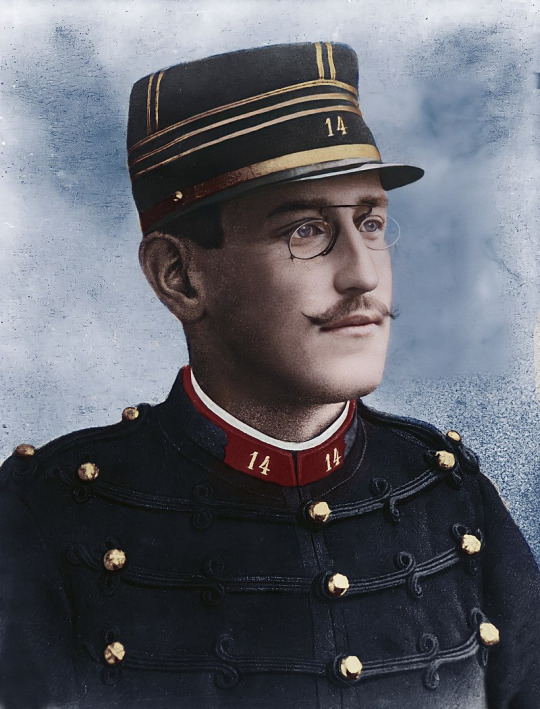
Alfred Dreyfus was a French artillery officer of Jewish ancestry from Alsace whose trial and conviction in 1894 on charges of treason became one of the most polarizing political dramas in modern French history. The incident has gone down in history as the Dreyfus affair, the reverberations from which were felt throughout Europe. It ultimately ended with Dreyfus' complete exoneration.
Born: October 9, 1859, Mulhouse
Died: July 12, 1935, Paris
Children: Pierre Dreyfus, Jeanne Dreyfus
Spouse: Lucie Dreyfus (m. 1891–1935)
Place of burial: Montparnasse Cemetery, Paris
Parents: Raphael Dreyfus, Jeannette Dreyfus
Dreyfus affair
Dreyfus affair, political crisis, beginning in 1894 and continuing through 1906, in France during the Third Republic. The controversy centred on the question of the guilt or innocence of army captain Alfred Dreyfus, who had been convicted of treason for allegedly selling military secrets to the Germans in December 1894. At first the public supported the conviction; it was willing to believe in the guilt of Dreyfus, who was Jewish. Much of the early publicity surrounding the case came from anti-Semitic groups (especially the newspaper La Libre Parole, edited by Édouard Drumont), to whom Dreyfus symbolized the supposed disloyalty of French Jews.
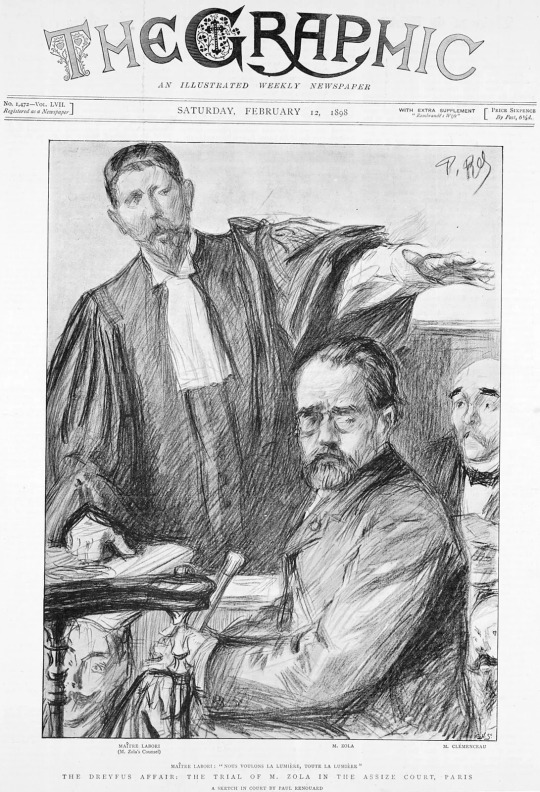
Zola, Émile: Newspaper depiction of Émile Zola in court during his trial for defamation of the French military, 1898.
The effort to reverse the sentence was at first limited to members of the Dreyfus family, but, as evidence pointing to the guilt of another French officer, Ferdinand Walsin-Esterhazy, came to light from 1896, the pro-Dreyfus side slowly gained adherents (among them journalists Joseph Reinach and Georges Clemenceau—the future World War I premier—and a senator, Auguste Scheurer-Kestner). The accusations against Esterhazy resulted in a court-martial that acquitted him of treason (January 1898). To protest against the verdict, the novelist Émile Zola wrote a letter titled “J’accuse,” published in Clemenceau’s newspaper L’Aurore. In it he attacked the army for covering up its mistaken conviction of Dreyfus, an action for which Zola was found guilty of libel.
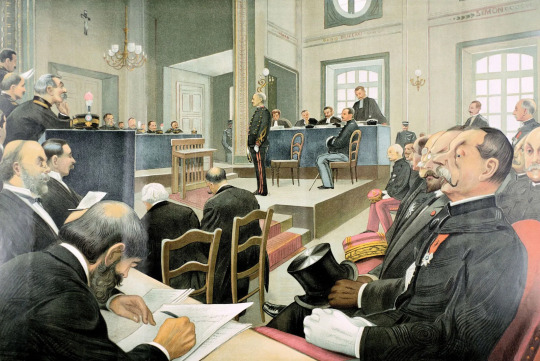
The second court-martial of Alfred Dreyfus, illustration from Vanity Fair, Nov. 23, 1899.
By the time of the Zola letter, the Dreyfus case had attracted widespread public attention and had split France into two opposing camps. The anti-Dreyfusards (those against reopening the case) viewed the controversy as an attempt by the nation’s enemies to discredit the army and weaken France. The Dreyfusards (those seeking exoneration of Captain Dreyfus) saw the issue as the principle of the freedom of the individual subordinated to that of national security. They wanted to republicanize the army and put it under parliamentary control.
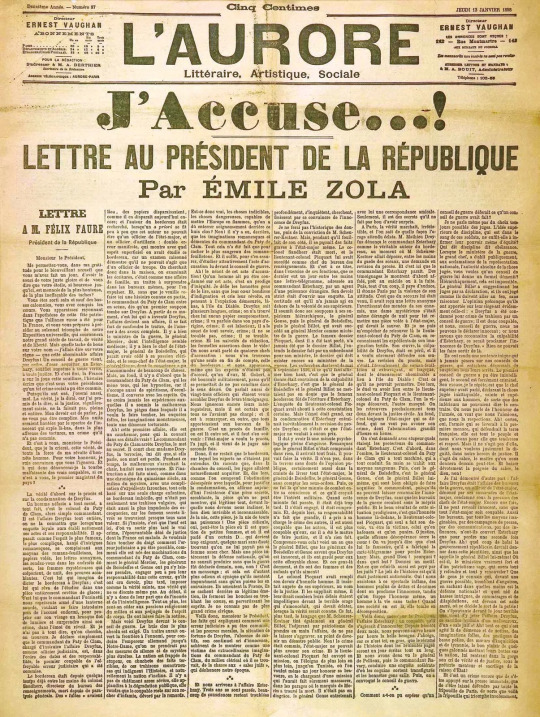
Front page of the newspaper L'Aurore, January 13, 1898, with the open letter “J'accuse” written by Émile Zola about the Dreyfus affair....(more) -From L'Aurore, January 13, 1898
From 1898 to 1899 the Dreyfusard cause gained in strength. In August 1898 an important document implicating Dreyfus was found to be a forgery. After Maj. Hubert-Joseph Henry of the intelligence section confessed to fabricating the document in order to strengthen the army’s position, revision was made almost certain. At the same time, the affair was becoming a question of vital concern to politicians. The republican parties in the Chamber of Deputies recognized that the increasingly vocal nationalist right posed a threat to the parliamentary regime. Led by the Radicals, a left-wing coalition was formed. In response to continuing disorders and demonstrations, a cabinet headed by the Radical René Waldeck-Rousseau was set up in June 1899 with the express purpose of defending the republic and with the hope of settling the judicial side of the Dreyfus case as soon as possible. When a new court-martial, held at Rennes, found Dreyfus guilty in September 1899, the president of the republic, in order to resolve the issue, pardoned him. In July 1906 a civilian court of appeals (the Cour d’Appel) set aside the judgment of the Rennes court and rehabilitated Dreyfus. The army, however, did not publicly declare his innocence until 1995.
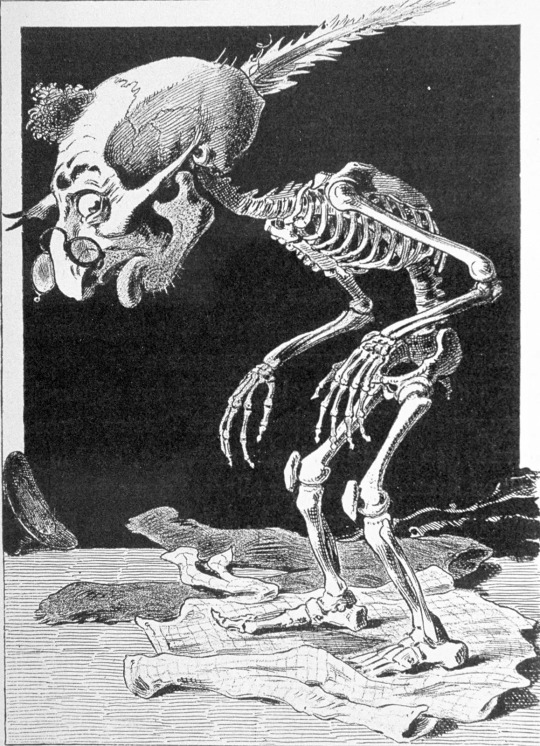
Anti-Semitic caricature: Caricature from the anti-Semitic Viennese magazine Kikeriki. Its caption reads: “In the Dreyfus Affair, the more that is exposed, the more Judah is embarrassed.”...(more) © United States Holocaust Memorial Museum
With the Dreyfusards in the ascendant, the affair marked the start of a new phase in the history of the Third Republic, a phase in which a series of Radical-led governments pursued an anticlerical policy that culminated in the formal separation of church and state (1905). By intensifying antagonisms between right and left and by forcing individuals to choose sides, the case made a lasting impact on the consciousness of the French nation.
Félix Faure | French Republic, Politics, Legacy | Britannica
In 1894, this made the French Army's counter-intelligence section, led by Lieutenant Colonel Jean Sandherr, aware that information regarding new artillery parts was being passed to Maximilian von Schwartzkoppen, the German military attache in Paris, by a highly placed spy most likely on the General Staff. Suspicion quickly fell upon Dreyfus, who was arrested for treason on 15 October 1894.
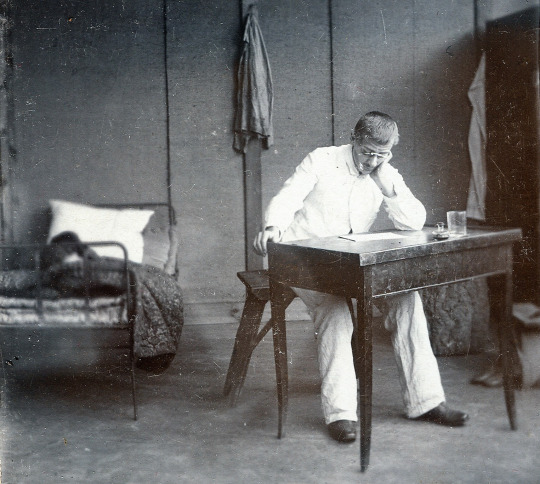
Alfred Dreyfus in his room on Devil's Island in 1898, stereoscopy sold by F. Hamel, Altona-Hamburg…; collection Fritz Lachmund
On 5 January 1895, Dreyfus was summarily convicted in a secret court martial, publicly stripped of his army rank, and sentenced to life imprisonment on Devil's Island in French Guiana. Following French military custom of the time, Dreyfus was formally degraded (cashiered) by having the rank insignia, buttons and braid cut from his uniform and his sword broken, all in the courtyard of the École Militaire before silent ranks of soldiers, while a large crowd of onlookers shouted abuse from behind railings. Dreyfus cried out: "I swear that I am innocent. I remain worthy of serving in the Army. Long live France! Long live the Army!...Continue
The affair ultimately ended with Dreyfus' complete exoneration.
Dreyfus died in Paris aged 75, on 12 July 1935, exactly 29 years after his exoneration.
Alfred Dreyfus - Wikipedia
10 notes
·
View notes
Text
The body of a French teenager who went missing 13 months ago has been found after a long police search halfway across the country from where she was last seen, authorities have announced.
Police had been searching for the 15-year-old — referred to only as "Lina" in French media — since her mysterious disappearance on Sept. 23 last year.
They had amassed thousands of reports, conducted hundreds of interviews and analyzed hundreds of vehicles.
But it was GPS data extracted from the presumed killer's car that led to her discovery on Wednesday, in a wooded area in the central French Nievre region, some 310 miles from where she went missing in Alsace in the country's east.
DNA testing enabled the body to be identified, said Alexandre Chevrier, Strasbourg's acting chief prosecutor.
The teenager's smartphone tracking signal was lost at 11:22 a.m. on Sept. 23, last year, as she was walking on a small road towards the station of Saint-Blaise-La-Roche, a hamlet of barely 250 inhabitants, to catch a train to Strasbourg where she was to meet up with her boyfriend.
A week later, police opened a probe into suspected kidnapping.
After months of fruitless investigation, police identified a car, a Ford Puma, that was known to have been in the vicinity when Lina went missing.
The vehicle was used by the main suspect in the case, Samuel Gonin, who died by suicide in July before he could be questioned. According to French radio network RTL, Gonin left a farewell letter, which reads in part: "I have lost my honor, my dignity, my humanity, I must leave. I do not know how to control myself, it is going too fast."
Analysis of his car's geo-location data allowed police to identify several stops it had made, including the one made a day after Lina's disappearance, that eventually led to the discovery of the body. RTL, citing the prosecutor, reported her body was found submerged in a stream below an embankment.
Post-mortem examinations, including an autopsy, will help determine the cause of death.
General Daoust, former lab director of the forensic science department of the French national police, told RTL that "even if the body may be very degraded, it will provide a certain number of answers."
7 notes
·
View notes
Text

THE DESCRIPTION OF SAINT FIDELIS OF SIGMARINGEN The Patron of Lawyers and the Protomartyr of the Congregation of Propaganda Fide Feast Day: April 24
"It is because of faith, that we exchange the present for the future."
Fidelis was born Mark Roy or Rey, in 1577, in the town of Sigmaringen, a town in modern-day Germany, then under the Principality of Hohenzollern-Sigmaringen. His father's name was John Rey.
After gaining a Doctorate in Law at the University of Freiburg, he began embracing the cause of the oppressed, earning for himself the nickname of 'Poor Man's Lawyer', because upon his return, he practiced law as a counselor or advocate, at Colmar in Alsace, France.
In 1612, he left a promising career to enter the Capuchin order along with his brother George, where he was ordained a priest. Upon entering the order, the Custos (guardian) gave him the religious name of Fidelis, the Latin word for 'faithful', alluding to that text from the Book of Revelation which promises a crown of life to him who shall continue faithful to the end.
He led a life of penance and prayer, and was continuously engaged in preaching and hearing confessions.
He often exclaimed: 'Woe to me if I should prove myself, but a halfhearted soldier, in the service of my thorn-crowned Captain!'
At the request of the Congregation of Propaganda Fide (Congregation for the Evangelization of Peoples), he undertook a mission among the Zwinglians in the canton of the Grisons in Switzerland, and to preach in the Graubünden region of eastern Switzerland. Eight other Capuchin friars were to be his assistants, and they labored in this mission under his direction.
He spent much time at the foot of the altar, being convinced that prayer could achieve more than sermons. The conversion of many Protestants enraged his opponents - the Calvinists, who plotted to assassinate him.
On April 24, 1622, as he was preaching at Grüsch, he said: 'O Catholic faith, how solid, how strong you are! How deeply rooted on a solid rock! Heaven and earth will pass away, but you can never pass away.'
From Grüsch, he went to Seewis im Prättigau, where he was met by a band of heretics who killed him. Before receiving the death-stroke, he prayed for his persecutors.
The conversion of the Protestant minister, who witnessed the assassination, was the first fruit of his martyrdom. After six months, the martyr's body was found to be incorrupt, but his head and left arm were separated from his body.
The body parts were then placed into two reliquaries, one sent to the Cathedral of Coire, at the behest of the bishop, and laid under the High Altar; the other was placed in the Capuchin church at Weltkirchen, Feldkirch, Austria.
#random stuff#catholic#catholic saints#franciscans#fidelis of sigmaringen#fidel de sigmaringa#lawyers
2 notes
·
View notes
Text
#1277 What was the dancing plague of 1518?


What was the dancing plague of 1518? The dancing plague of 1518 happened in Strasbourg, France, and up to 400 people couldn’t stop dancing for several weeks. It is said that many people died of exhaustion. Everything is said to have started in July 1518, in a town called Strasbourg, which is now in France, but was in Alsace at the time. A woman called Frau Troffea began to dance in a central square. She had no musical accompaniment and just danced to her own rhythm. People clapped along with her, but when she didn’t stop, they realized it was something more. Frau Troffea danced for 6 days and nights without pausing. In the beginning, people only watched, but then others began to join in and dance to their own beat. More and more people joined until there were hundreds. They danced all through July, all through August, and into early September. By mid September, the dancers had stopped. People danced without stopping, without food, and without sleep. It is said that at the peak of the dancing plague 15 people a day died from exhaustion and heart attacks. Overall, hundreds of people died before the plague subsided. The first question is whether or not this actually happened. It did happen. There are documents that record the event from the time that still survive. There are notes from physicians, written copies of sermons given in cathedrals, regional histories that mention it, and some notes left by the city council of Strasbourg. There is no doubting that the event happened. However, there are no records of people having died. Even the Strasbourg city council, which would be the most likely to record any deaths if they had happened, doesn’t make any mention of them. All of the records of people dying come from accounts of the event written years later. There are no contemporary accounts of people dying. So, what could have caused it? There are several theories that have risen up. At the time, people thought it could have been demon possession. It was also a very hot summer and another theory was that it was overheated blood. A modern theory is that the dancing was produced by some kind of fungal infection. There is a mold that grows in damp rye called ergot. Ergot is a fungus that produces ergotamine, which is what LSD was originally synthesized from. If bread is made with the ergot infected rye, the mold will be baked into the bread and people can consume it. Being a psychedelic drug, ergot can cause severe hallucinations, seizures, and is fatal in large doses. The seizures could have been mistaken for dancing and the deaths could have been caused by the drug. However, it kills quickly and seizures last for minutes, not for days. So, if it wasn’t chemical, what was it? Another theory, and probably a more likely one, is that it was simply a case of mass-hysteria. 1518 was the tail end of a series of disasters that had befallen Strasbourg. There had been numerous poor harvests due to hot weather and low rainfall. This had driven up the price of grain. Leprosy had reared its ugly head, along with smallpox and syphilis outbreaks. The bubonic plague had returned for a while. Many people were sick and many more people were starving. People in that frame of mind are very susceptible to suggestion and more people in the 16th century were religious than they are these days. The theory is that people were overly stressed by all of these events and they were led to believe that more would befall them. Many people were also led to believe that St. Vitus, a Catholic saint and the saint of dancing, had cursed them to misery and to dance. It could be that one person (perhaps this Frau Troffea, perhaps not) started to dance, claiming that she was cursed, and the dancing just spread across a susceptible and stressed population. This was certainly not the first dancing plague and also not the last. There have been several other incidences of it happening. If people thought that something like this had happened before, it would make it even easier for them to believe and to dance. Hysteric events like this feed themselves because the more people that dance, the more people that believe and start to dance. It seems inarguable that this happened and that hundreds of people danced. It also seems likely that it was mass-hysteria brought on by too much hardship. However, it doesn’t seem likely that hundreds of people died. It is not impossible for people to die while hysterical, but if they had, there would certainly be records of it. The story was most likely exaggerated after the fact. And this is what I learned today. Try these next: - #1040 Why is breakdancing called breakdancing? - #343 How did the Black Death spread? - #942 What could the 10 plagues in the bible have been? - #344 How did the Black Death change society? - #997 Is there a land speed record limit? Sources https://web.archive.org/web/20121013075434/http://dsc.discovery.com/news/2008/08/01/dancing-death-mystery.html https://www.euppublishing.com/doi/10.3366/drs.2017.0199 https://www.britannica.com/event/dancing-plague-of-1518 https://www.history.com/articles/what-was-the-dancing-plague-of-1518 https://www.bbc.com/culture/article/20220512-the-people-who-danced-themselves-to-death https://en.wikipedia.org/wiki/Dancing_plague_of_1518 https://www.bbc.com/future/article/20161028-the-town-the-nearly-danced-itself-to-death https://bigthink.com/the-past/dancing-plague-middle-ages Image By Pieter Brueghel the Elder - Pieter Bruegel d. Ä. - Das gesamte graphische Werk. Wien-München: Schroll , Abb. Nr. 124 (Scan durch H.-P.Haack, Leipzig), Public Domain, https://commons.wikimedia.org/w/index.php?curid=3307982 Read the full article
0 notes
Text
MOTEUR ACTION
FRENCHIE
By Trump
Led Zeppelin
Has been
Officially
Named the
Geatest
Band of Human Story
Big Brother
Deuxième Reich
Empire Germanique
Casques à pointes
SS le début d'une Sécurité-Sociale
Alsace-Lorraine
Un vir-us informatique
Amérique
Base Américaine en Allemagne
Un Western Club Kaiserslautern
Une entraîneuse défend un soldat français
Un américain bourré le traitait
Haineusement de Frenchie
Mais elle met
Led Zeppelin
Whole Lotta Love
Samedi 22 février 2025
0 notes